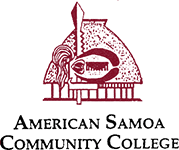American Samoa Community College MOODLE
15 Week Session
The study of the criminal justice system, its components, procedures, and interrelationships between the components: the police, prosecution, courts and the corrections. It also examines the impact of the concept of justice and other re-occurring issues upon the public and private sectors, and the community in the United States as well as American Samoa. (Note: 3 lecture credits)
- Teacher: Walter Laussen
This course covers the basics in police patrol functions and duties. It is aimed at preparing the prospective police officer with the skills and abilities in conducting traffic investigations, traffic stops, roadblocks, drunken driving sobriety testing, arrest and vehicle search procedures, and the common traffic officer role. (Note: 3 lecture credits)
- Teacher: Tiana Trepanier
This course covers the basics in police patrol functions and duties. It will cover the proper procedures of safety patrol principles, selective enforcement, beat analysis, vehicle stops, searches and seizures, field interrogation, and other common patrol functions. (Note: 3 lecture credits)
- Teacher: Tiana Trepanier
The philosophical and historical development of probation and parole are discussed, including their functions, role and impact on the Criminal Justice System and community. The course covers the decisions to grant probation, and/or parole, conditions imposed, revocation hearings, statutory provisions governing probation and parole administrations and supervision, parole board and other related issues. (Note: 3 lecture credits)
- Teacher: Tiana Trepanier
This course covers the origin, development and philosophy of criminal evidence. It will enable the student to understand the constitutional and procedural consideration for rules of evidence, the applicability of rules to criminal and civil matters, rules governing admissibility, and an overview of evidentiary privileges. (Note: 3 lecture credits)
- Teacher: Tiana Trepanier
This course covers crime scene investigation, collection, and preservation of evidence, interrogation of suspects, admissibility of evidence and confessions. (Note: 3 lecture credits)
- Teacher: Tiana Trepanier
The historical and philosophical development of criminal law is examined. Major emphasis is on substantive criminal law, definitions, procedures, and elements of crime from the common law system, including recent developments that have been incorporated in statutes and/or case laws. Concepts such as jurisdictions, mental element, criminal defenses, and more are examined as their applications to the system of criminal justice. (Note: 3 lecture credits)
- Teacher: Rosie Ah Chee-Toeava
This course offers a philosophical, historical and practical survey of the juvenile justice system. It covers theories of causation, factors and characteristics of delinquency, and a survey of the treatment and prevention programs. (Note: 3 lecture credits)
- Teacher: Walter Laussen
The philosophical and historical development of corrections, functions, objectives, personnel, and rehabilitative and community based programs. The course will also cover the relationship of probation and parole to correctional goals and objectives. (Note: 3 lecture credits)
- Teacher: Walter Laussen
This course covers the nature of transnational crimes and comparative crime by analyzing the trends and causes. Understand the relationship between globalization and transnational crimes. (Note: 3 lecture credits)
- Teacher: Alexander Baker
